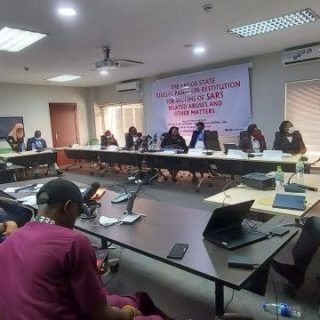Citizen is a column that explains how the government’s policies fucks citizens and how we can unfuck ourselves.
A law is a system of rules that regulates how people in a society behave.
Once a bill becomes a law, any action against the law is deemed illegal and carries a punishment if a person is found guilty by the court of law. This is why it is important to know how a bill becomes a law.
Read: Nigerians React To The Social Media Bill Proposed By The Senate
Stage 1: Origin of a bill
A bill is a draft of a proposed law that is presented by a lawmaker before the legislature for deliberation before passage into law.
A bill must be presented on the floor of the senate, house of representatives or a house of assembly before it can be passed into law.
Section 76 of the senate standing orders (2015) as amended provides that there are three classes of bills: executive bills, member’s bills and private bills.
An executive bill is a bill from any arm or member of the executive, like the president, a minister, or an agency of government.
An executive bill has to be sent to the speaker of the house of reps and the senate president with a cover letter personally signed the president.
A member’s bill is a bill that is from any member of the house of assembly, or a group of members.
A member’s bill has to be sent to the senate president or the speaker of the house of representatives before it is read and discussed on the floor of the senate.
A private bill is any bill that is not an executive bill or a member’s bill.
A private bill has to be sent to the speaker of the house of representatives or the senate president before it can be read and discussed on the floor of any house of assembly.
Stage 2: Initial Review of the Bill
Once a bill is received on the floor of the senate or the house of representatives, the senate president or the speaker of the house of representatives forwards the bill to the senate committee on rules and procedure or to the house of representatives committee on rules and business for a review of the bill.
These committees are committees of the national assembly, and their job is to publish the bill in the schedule of bills and register it in the register of bills. They will also review if the bill is well written and then determine when the bill can be presented on the floor of the senate or house of representatives.
If the bill is not well written, it is forwarded to the legal department of the national assembly so it can be re-drafted. Once this is done, the committee will send a printed copy of the bill to every house member, and then determine when the bill can be read for the first time on the floor of the senate or the house of representatives.
Stage 3: Gazetting of the bill
The next process after a review of the bill is to put the bill in an official gazette.
A gazette is an official and legal newspaper of a country that publishes the new laws and official notices from the government.
It is important to gazette a bill so that members of the public can be aware that the senate or house of representatives is considering passing a new bill into law.
The public can also give their opinions and recommendations on the bill by writing to the senate or house of representatives.
Step 4: First reading of the bill
Once a bill has been gazetted, the bill is read on the floor of the house of representatives or senate by the clerk.
The clerk will read a short title of the bill and present it to the senate president or the speaker of the house of representatives.
At this stage, there is no debate or discussion over the bill, as the purpose of the presentation is to inform the lawmakers that a new bill has been introduced.
Step 5: Second reading of the bill
This is when a bill is debated on the floor of the legislative chamber.
If the bill is a senate bill or a house bill, the sponsor of the bill will move a motion that the bill should be read a second time. The legislator will also talk about the purpose of the bill, including the objectives, benefits and general principles behind the bill.
If the bill is an executive bill, a motion will be moved by the senate president or the speaker of the house of representatives, who will talk about the purpose, objectives, benefits and general principles behind the bill.
A motion is a formal proposal for a discussion or a conclusion on the floor of the legislative chamber.
After this introduction, a motion that supports the initial motion must be moved by another lawmaker if the bill is a senate or house bill, or by a member of the president’s party, if the bill is an executive bill. Before the bill can be read a second time.
If no motion seconds the first motion, the bill cannot be read a second time.
Once a second motion is moved, the chamber goes ahead to debate the bill. The bill is then put to a vote on whether it should be moved to the committee stage. If a majority of lawmakers vote for the bill to move to the committee stage, then the bill moves to the committee stage. If not, the bill ends at this point.
If the bill moves to the committee stage, the senate president or speaker of the house of representatives must determine the relevant committee to oversee the bill.
Step 6: Committee stage
There are currently 57 standing committees in the senate and 89 standing committees in the house of representatives. Each committee considers all the issues that concern a subject e.g a health committee will be concerned about all health issues.
When a bill moves to the committee stage, the committee examines the bill thoroughly.
The committee is also expected to organise a public hearing for the bill, where members of the public can attend and debate the bill.
A member of the public can make suggestions on any aspect of the bill, but only a member of the committee can make an amendment to the bill.
However, all amendments that are made to the bill must be in line with the initial objectives and purpose of the bill.
Step 7: Committee report
Once the public hearing is concluded, the committee must make a report of its work. The chairperson of the committee must submit a report of the committee’s work to the senate or the house of representatives.
After the report of the committee, the house will decide, via a motion, whether the bill should be read a third time, either immediately or later.
Step 8: Third reading
The third reading of a bill is the last time the bill can be read, and no amendments can be made to the bill again after it has passed the third reading stage.
However, if a legislator wishes to amend a bill before it passes the third reading stage, the person must move a motion that the bill should be taken back to the committee stage.
If the motion is agreed upon, the house of representatives or the senate will discuss the bill and recommend amendments. After this, the assembly will move the bill to the third reading stage.
Step 9: A clean copy of the bill
After the bill passes the third reading stage, a clean copy of the bill, which is signed by the clerk and endorsed by the senate president or the speaker of the house of representatives, is printed.
The clean copy will then be sent to the clerk of the other house of assembly, with a message requiring the agreement of the other chamber.
Step 10: Concurrence
Nigeria operates a bicameral legislature, courtesy of section 4 of the constitution. This means that the two houses of assembly i.e. the senate and the house of representatives must pass a bill into law.
The other house of assembly sends the bill to the clerk of the national assembly if it agrees to the bill.
However, if the other house of assembly does not agree with some parts of the bill, it may make adjustments to the bill before sending it to the clerk of the national assembly.
If the house of assembly that first passed the bill does not agree with the new amendments, then both houses of assembly will set up a “conference committee” where they will work together on the amendments.
If the joint committees come out with a report and send it to the houses of assembly, which is then accepted, then the bill is sent to the clerk of the originating house of assembly and a clean bill is sent to the clerk of the national assembly.
Step 11: Assent of the president
Once there is concurrence on a law, then the clerk of the national assembly will “enrol” the bill for the president’s signature.
Enrolment is when the clerk of the national assembly produces a clean copy of the bill, certifies it and then forwards it to the president for the president’s assent.
Courtesy of section 58 (4) of Nigeria’s constitution, the president has only 30 days to give his approval to a bill or not, and the bill cannot become a law until the president signs it into law.
If the president does not sign the bill within 30 days, he has vetoed the bill, and it cannot become a law. Also, if the president would like some amendments to the bill, the bill can be withdrawn from him and the national assembly can make the necessary amendments to the bill.
However, if the national assembly does not agree with the president’s veto, it has the power to pass the bill into law.
The two chambers will simply recall the bill sent to the president, and if a two-third majority (i.e 73 members in the Senate and 240 members in the house of representatives) vote for the bill to become a law, then the bill becomes a law even without the signature of the president.
Notes on the social media bill
The social media bill is currently at the committee stage.
On March 9, 2020, the senate committee on judiciary and legal matters, led by senator Opeyemi Bamidele, held a public hearing on the “Protection From Internet Falsehood and Manipulations Bill, 2019”.
At the public hearing, the bill drew sharp criticism from many civil society organisations, including media regulators like the Nigerian Communications Commission (NCC) and the Broadcasting Organisation of Nigeria (BON). However, the senate committee on judiciary and legal matters has yet to submit its report from the public hearing to the senate.
It is after the committee makes this report publicly available and presents it on the floor of the senate that the general public can have a good idea of what the committee thinks about the bill, and whether the Senate will go ahead on passing the bill into law.
Read: A Brief Timeline of The Social Media Bill
We hope you’ve learned a thing or two about how to unfuck yourself when the Nigerian government moves mad. Check back every weekday for more Zikoko Citizen explainers.
COMPONENT NOT FOUND: donation




